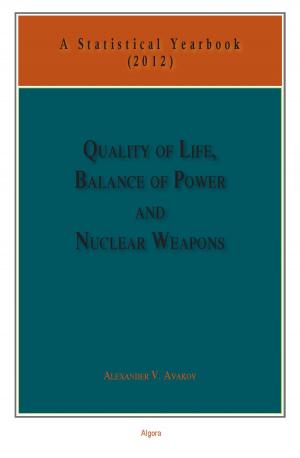Smokescreen
The US, NATO and the Illegitimate Use of Force
Nonfiction, Social & Cultural Studies, Political Science, Politics, Civil Rights| Author: | Paul F.J. Aranas | ISBN: | 9780875868967 |
| Publisher: | Algora Publishing | Publication: | December 15, 2009 |
| Imprint: | Algora Publishing | Language: | English |
| Author: | Paul F.J. Aranas |
| ISBN: | 9780875868967 |
| Publisher: | Algora Publishing |
| Publication: | December 15, 2009 |
| Imprint: | Algora Publishing |
| Language: | English |
The United States and NATO regularly employ the illegitimate use of force, using false arguments and a haze of purported altruistic justifications to justify their actions. But objective standards to legitimacy exist, and those standards are enshrined in the United Nations Charter.
Smokescreen analyzes the workings and legitimacy of the United Nations Security Council, and shows how the United States and NATO governments systematically create the false perception of legitimacy for the use of force. Whenever they cannot meet the standard, they simply employ alternative norm justifications of self-defense beyond the scope of Article 51 and humanitarian intervention.
Max Webers definition of legitimacy, legitimitätsglaube or the belief in legitimacy, has been widely used by social scientists. Unlike moral philosophers, social scientists favor empirical data; therefore, for them, measuring legitimacy becomes possible by measuring what people believe to be legitimate. In this framework the powerful have the ability to manipulate public opinion to create legitimacy for a particular action. The author argues that this is not legitimacy but merely a perception of legitimacy to justify aggression.
David Beetham maintains that Webers definition is a catastrophe, and in its place he offers a formula for legitimacy based on the objective criteria of legality, shared beliefs between dominant and subordinate, and consent from at least the most significant subordinate actors. This book argues that the United Nations Security Council, backed by the UN Charter, holds real legitimacy based on Beethams formula. Meanwhile, the U.S. education system and mass media largely ignore the history and principles of the United Nations.
The book offers a way forward toward international peace and security, in both the interests of Western countries and humanity as a whole.
The United States and NATO regularly employ the illegitimate use of force, using false arguments and a haze of purported altruistic justifications to justify their actions. But objective standards to legitimacy exist, and those standards are enshrined in the United Nations Charter.
Smokescreen analyzes the workings and legitimacy of the United Nations Security Council, and shows how the United States and NATO governments systematically create the false perception of legitimacy for the use of force. Whenever they cannot meet the standard, they simply employ alternative norm justifications of self-defense beyond the scope of Article 51 and humanitarian intervention.
Max Webers definition of legitimacy, legitimitätsglaube or the belief in legitimacy, has been widely used by social scientists. Unlike moral philosophers, social scientists favor empirical data; therefore, for them, measuring legitimacy becomes possible by measuring what people believe to be legitimate. In this framework the powerful have the ability to manipulate public opinion to create legitimacy for a particular action. The author argues that this is not legitimacy but merely a perception of legitimacy to justify aggression.
David Beetham maintains that Webers definition is a catastrophe, and in its place he offers a formula for legitimacy based on the objective criteria of legality, shared beliefs between dominant and subordinate, and consent from at least the most significant subordinate actors. This book argues that the United Nations Security Council, backed by the UN Charter, holds real legitimacy based on Beethams formula. Meanwhile, the U.S. education system and mass media largely ignore the history and principles of the United Nations.
The book offers a way forward toward international peace and security, in both the interests of Western countries and humanity as a whole.















